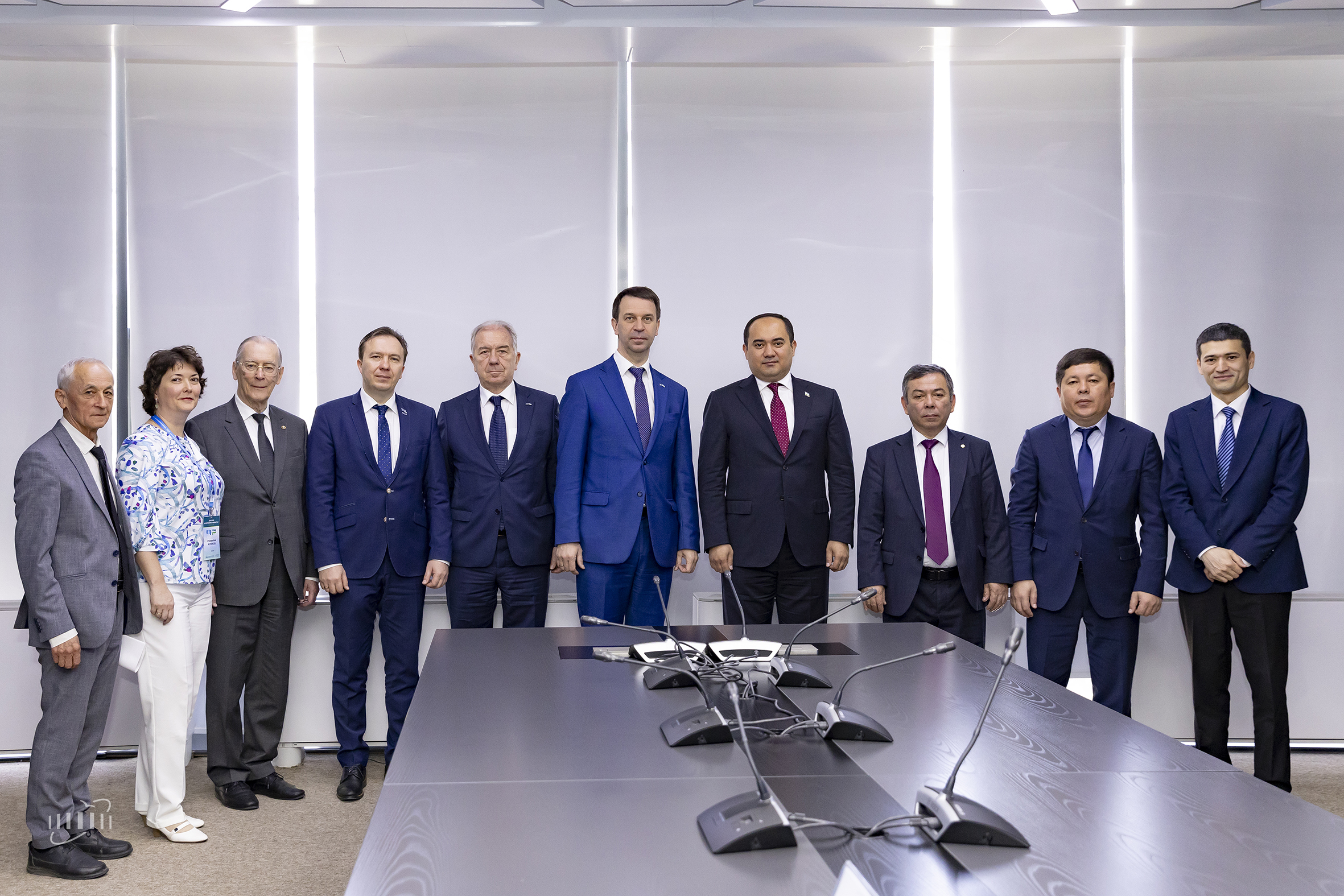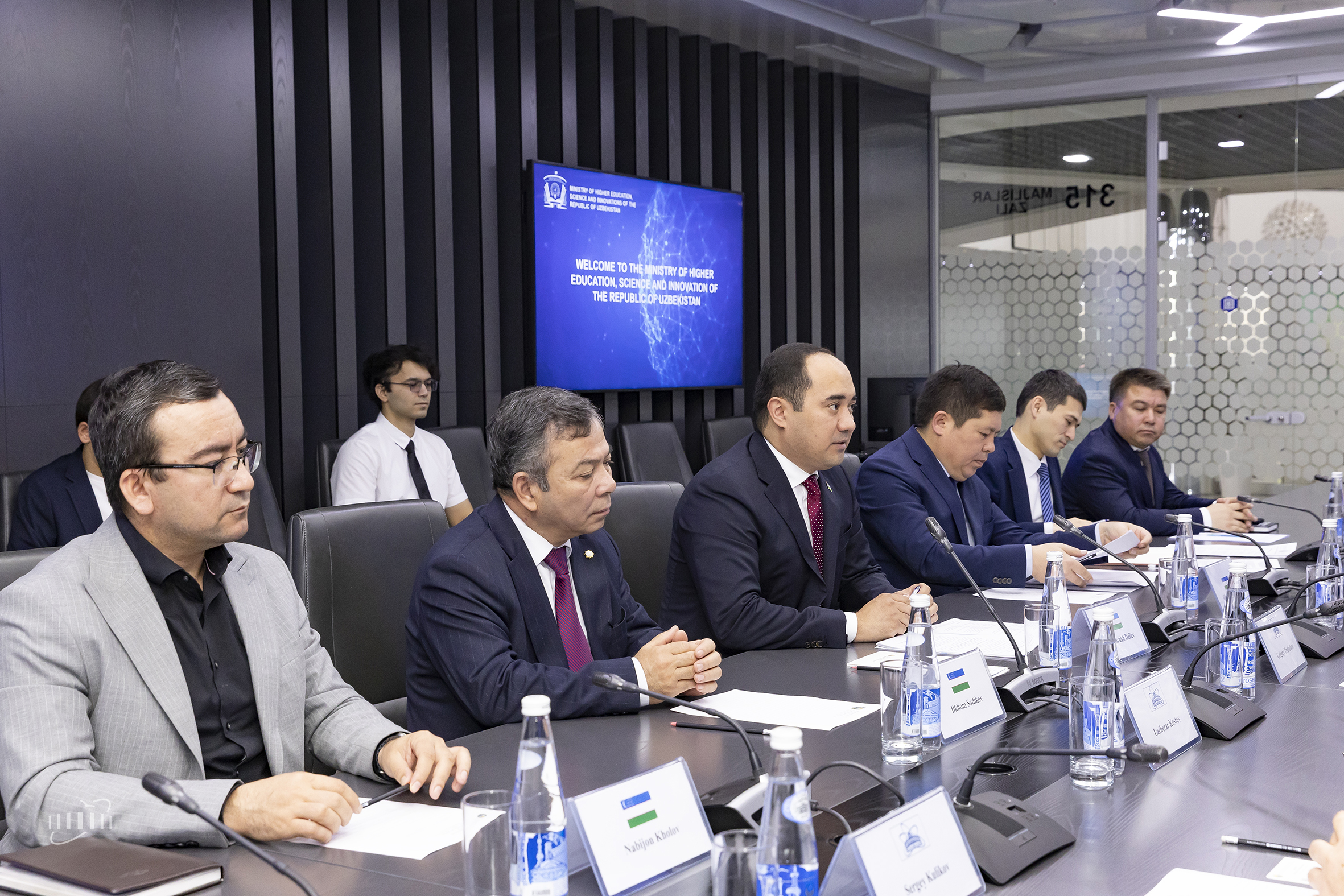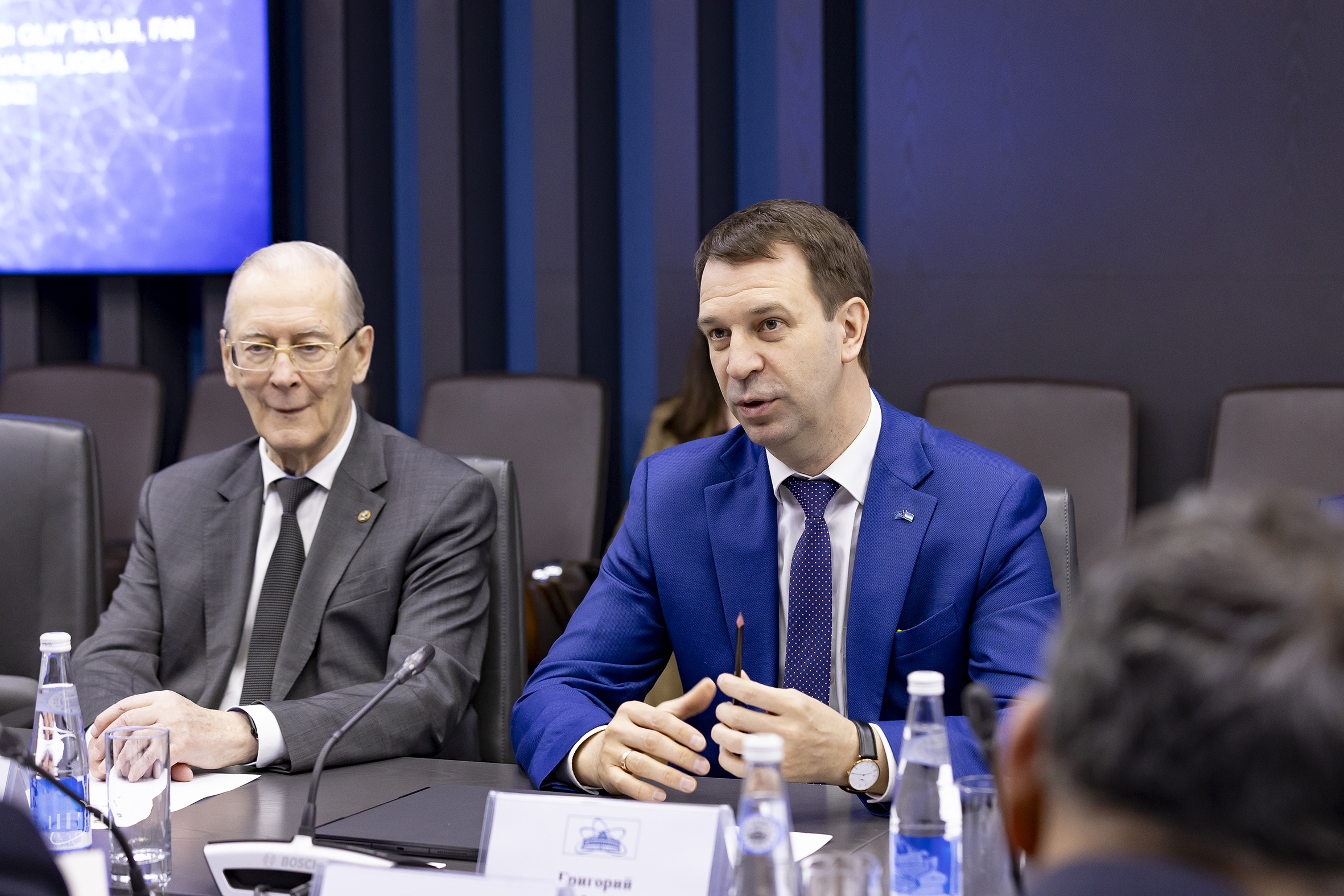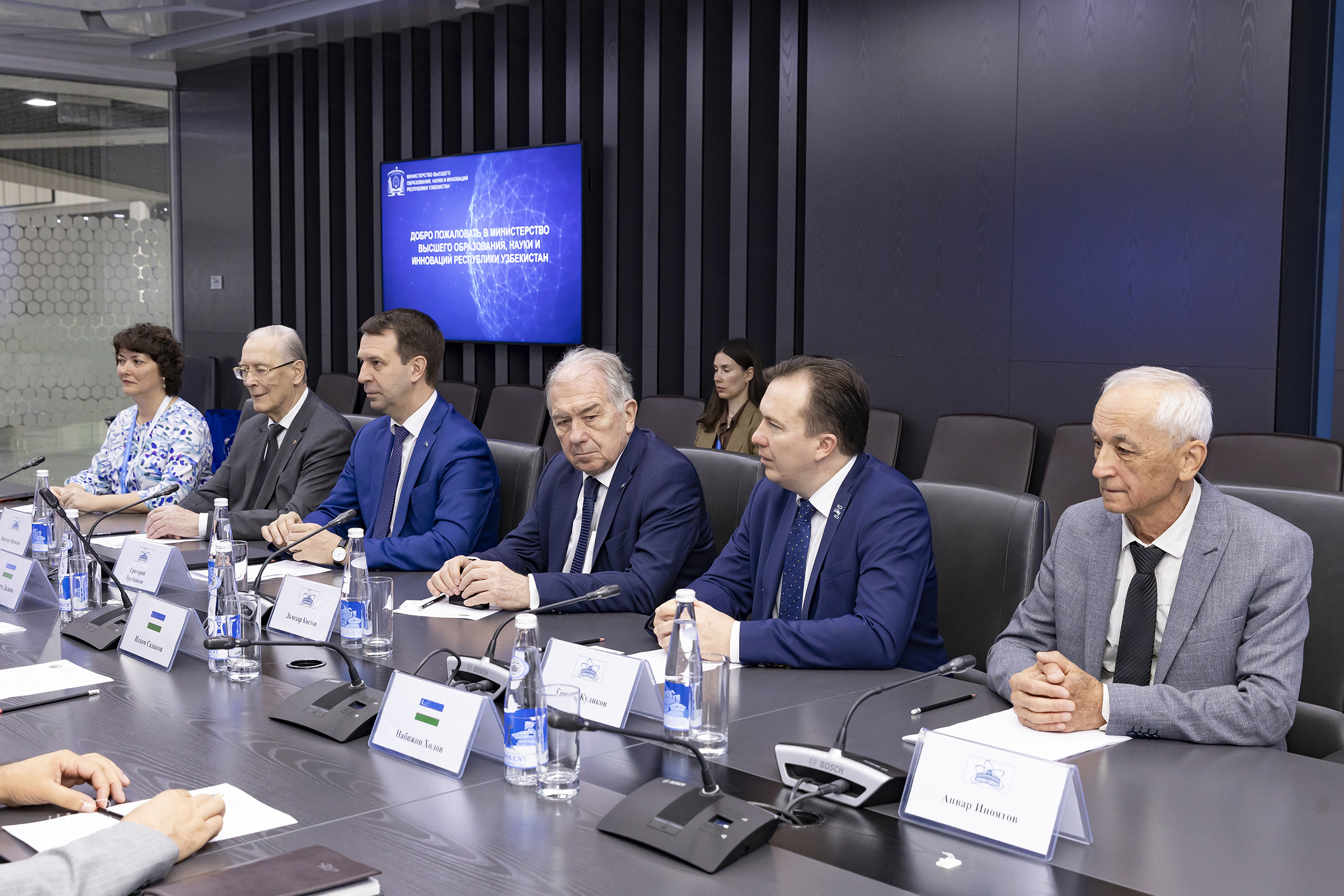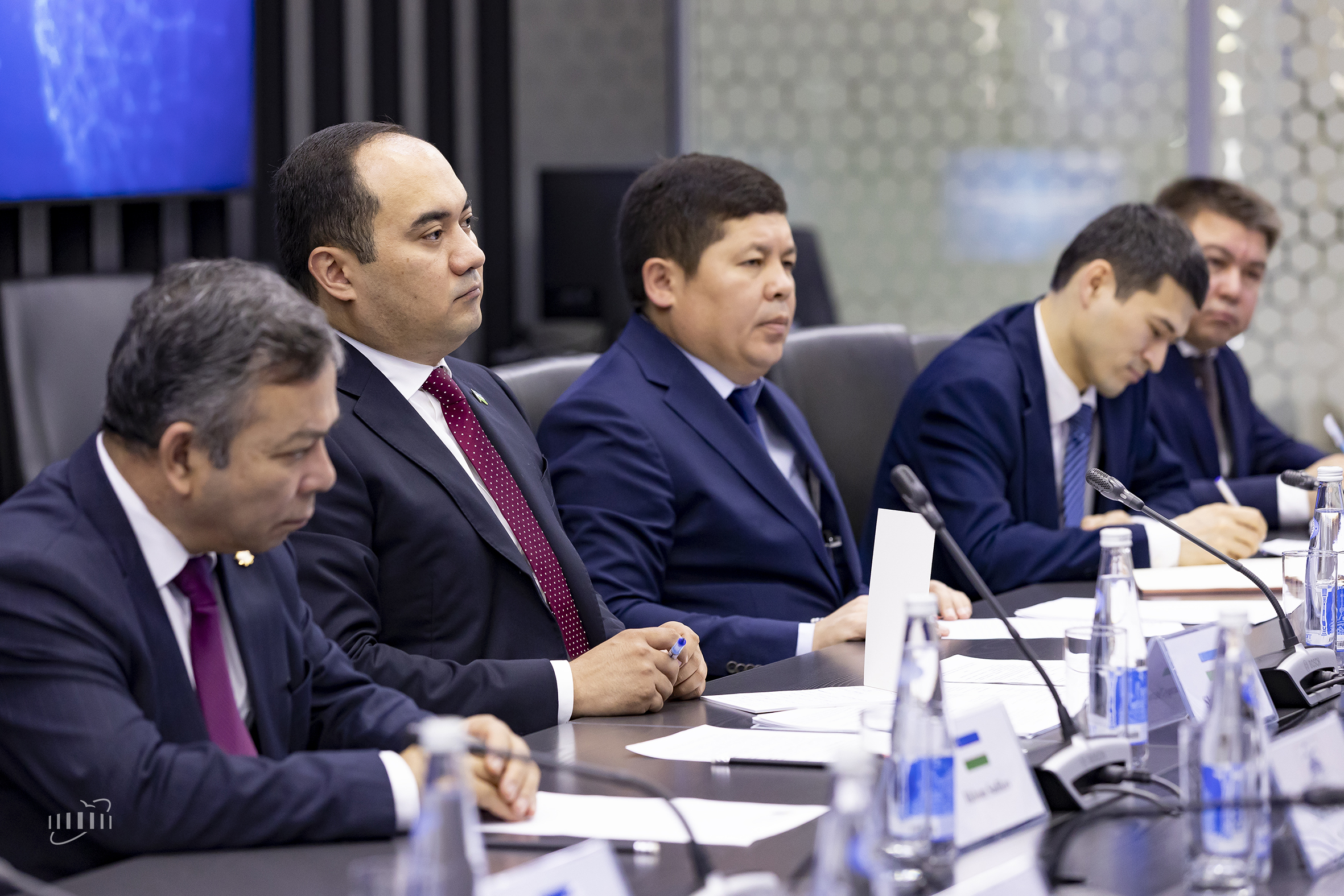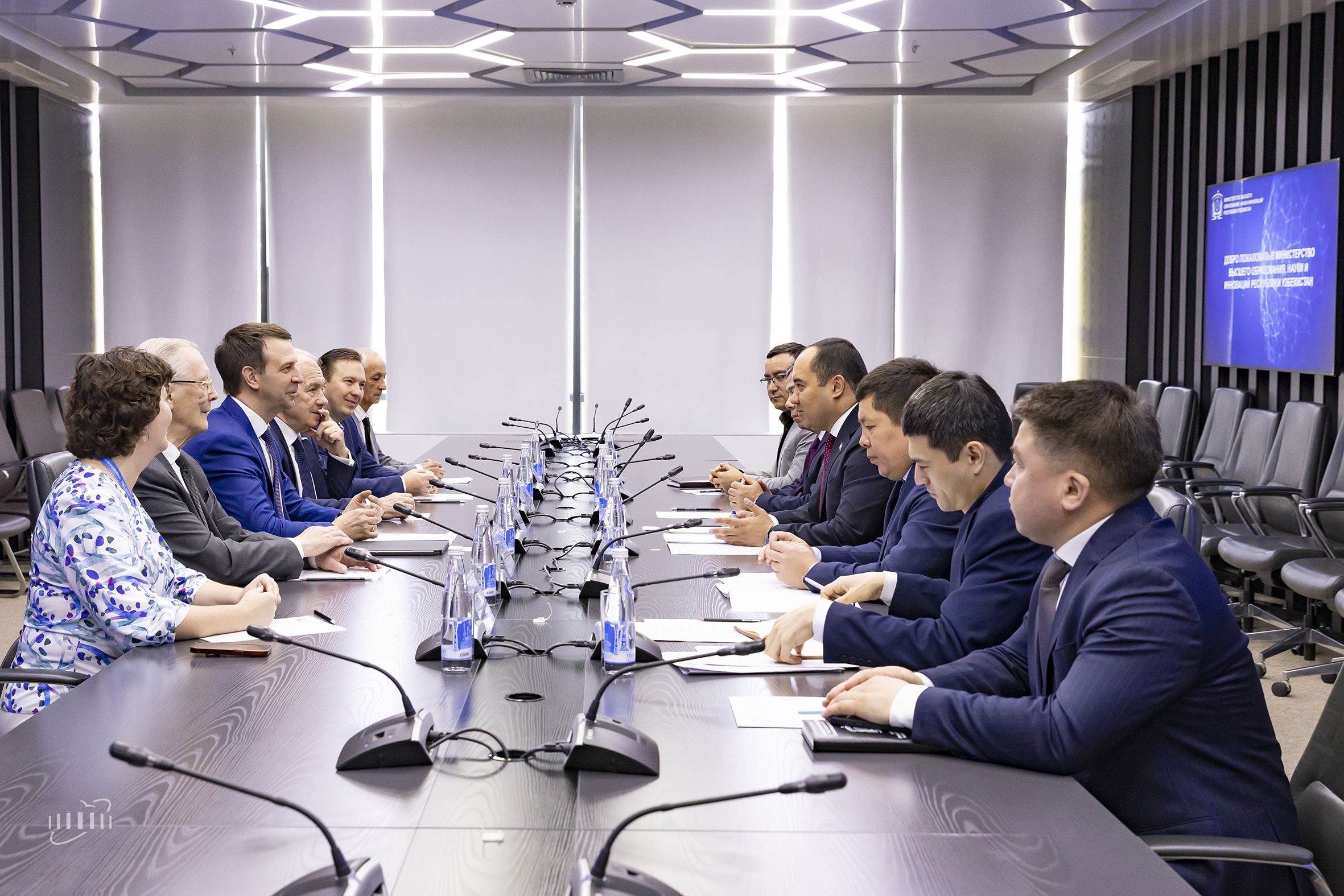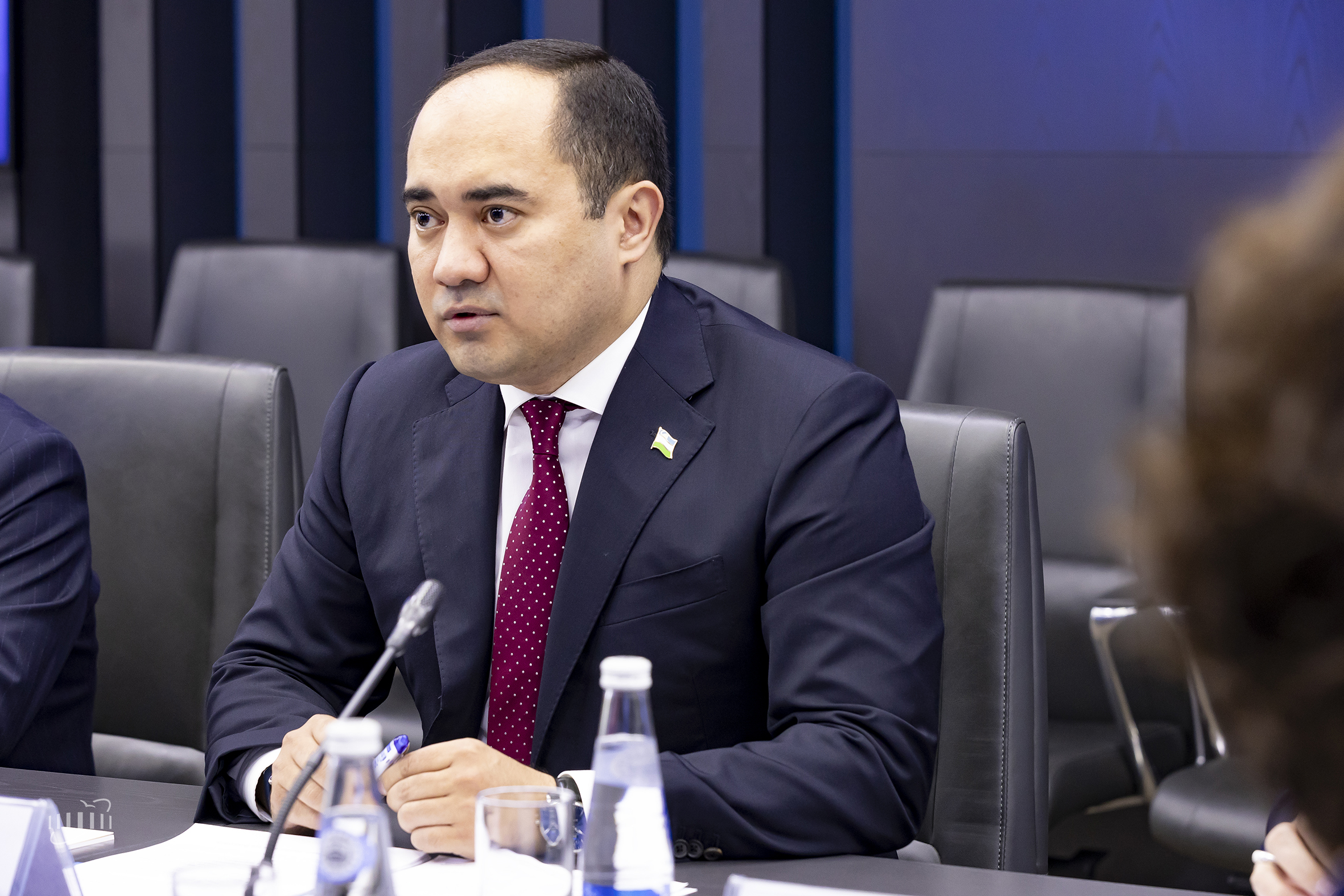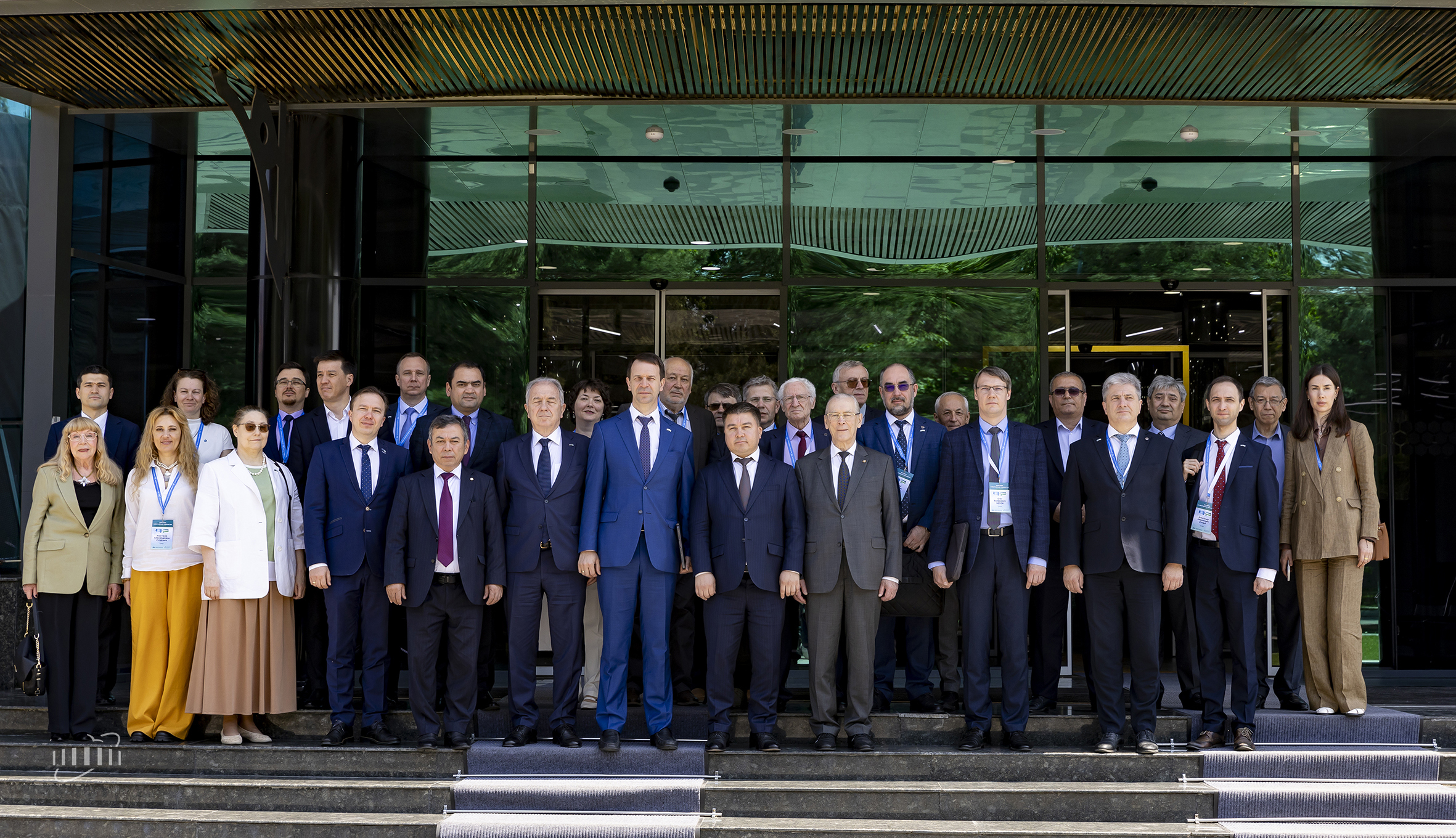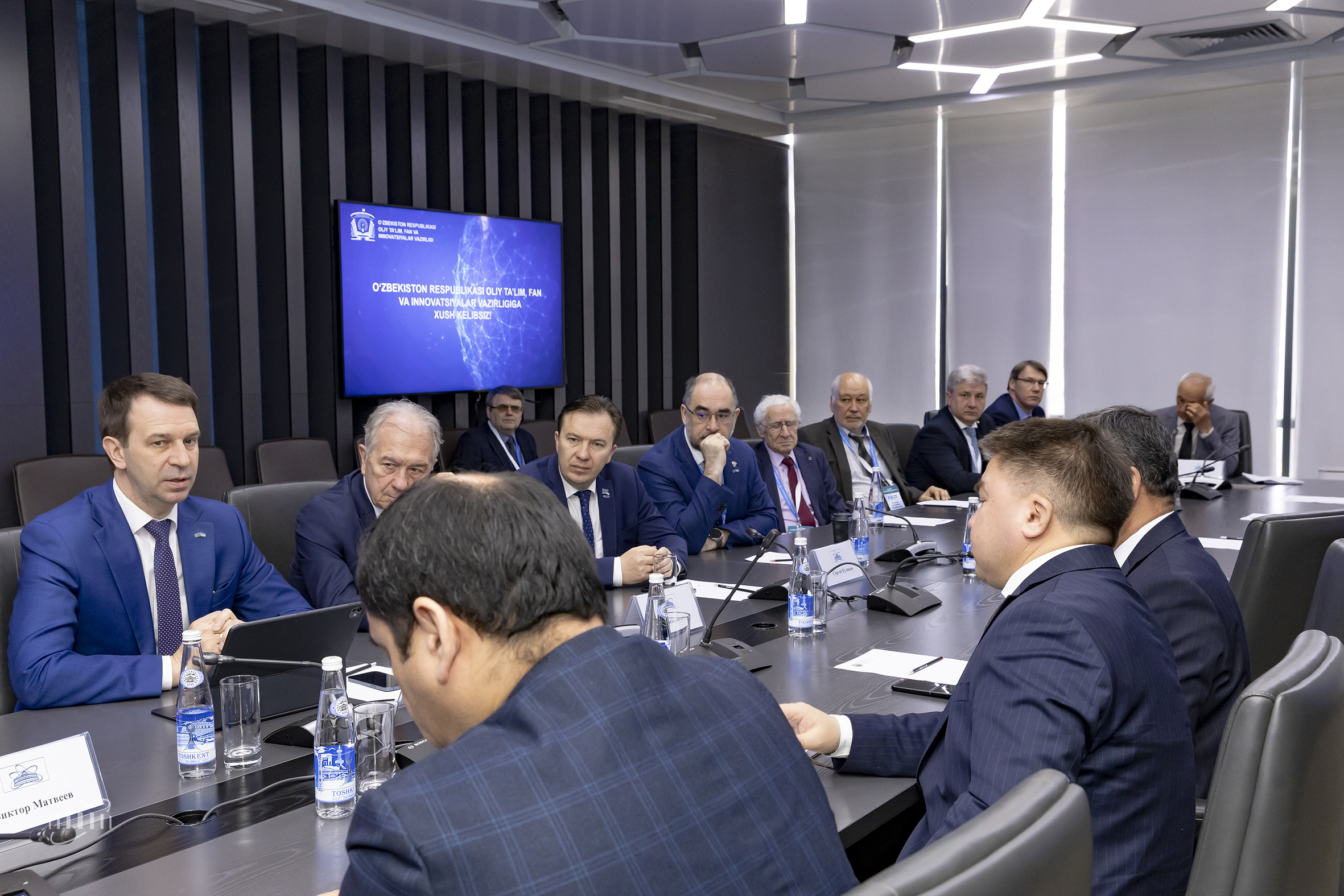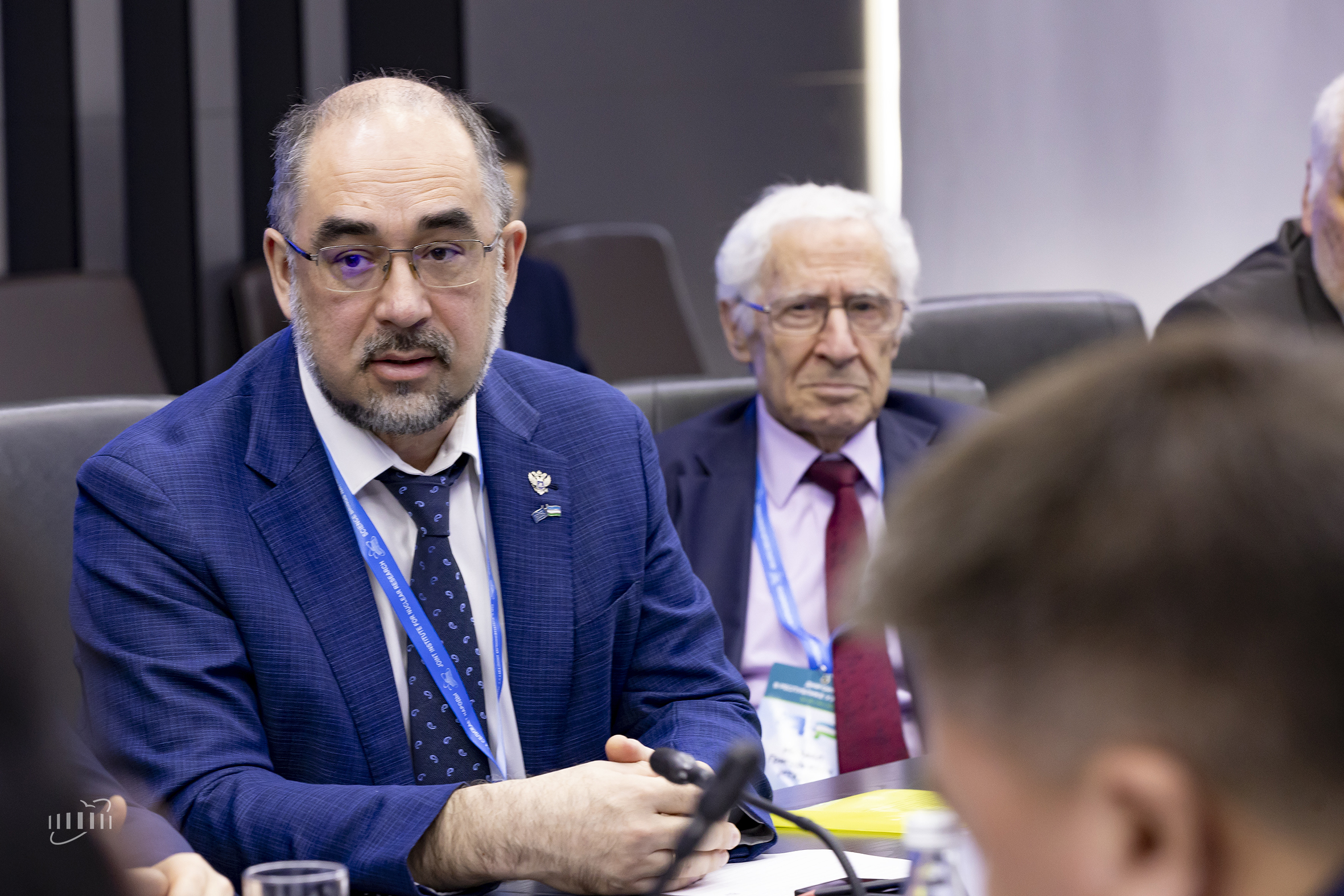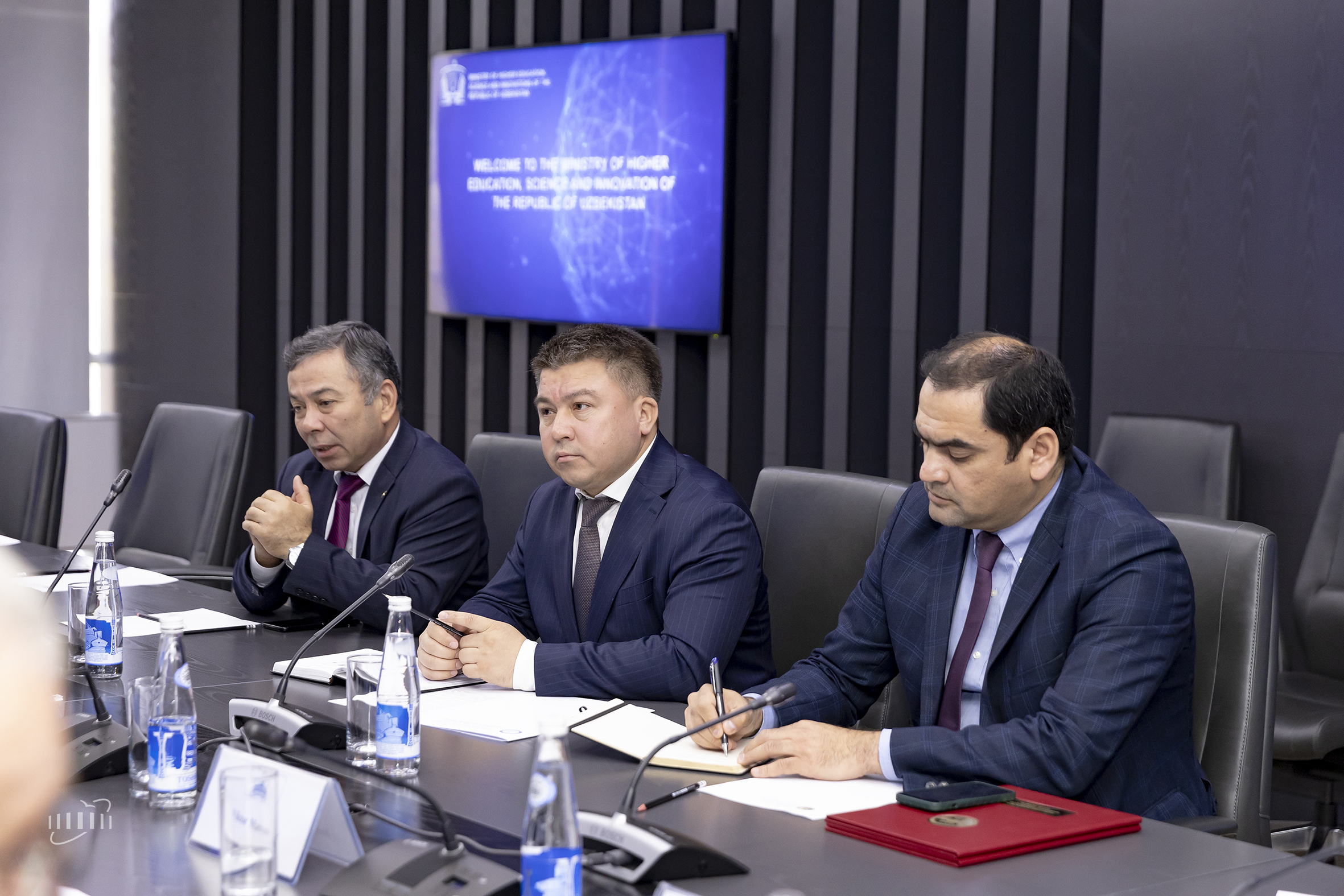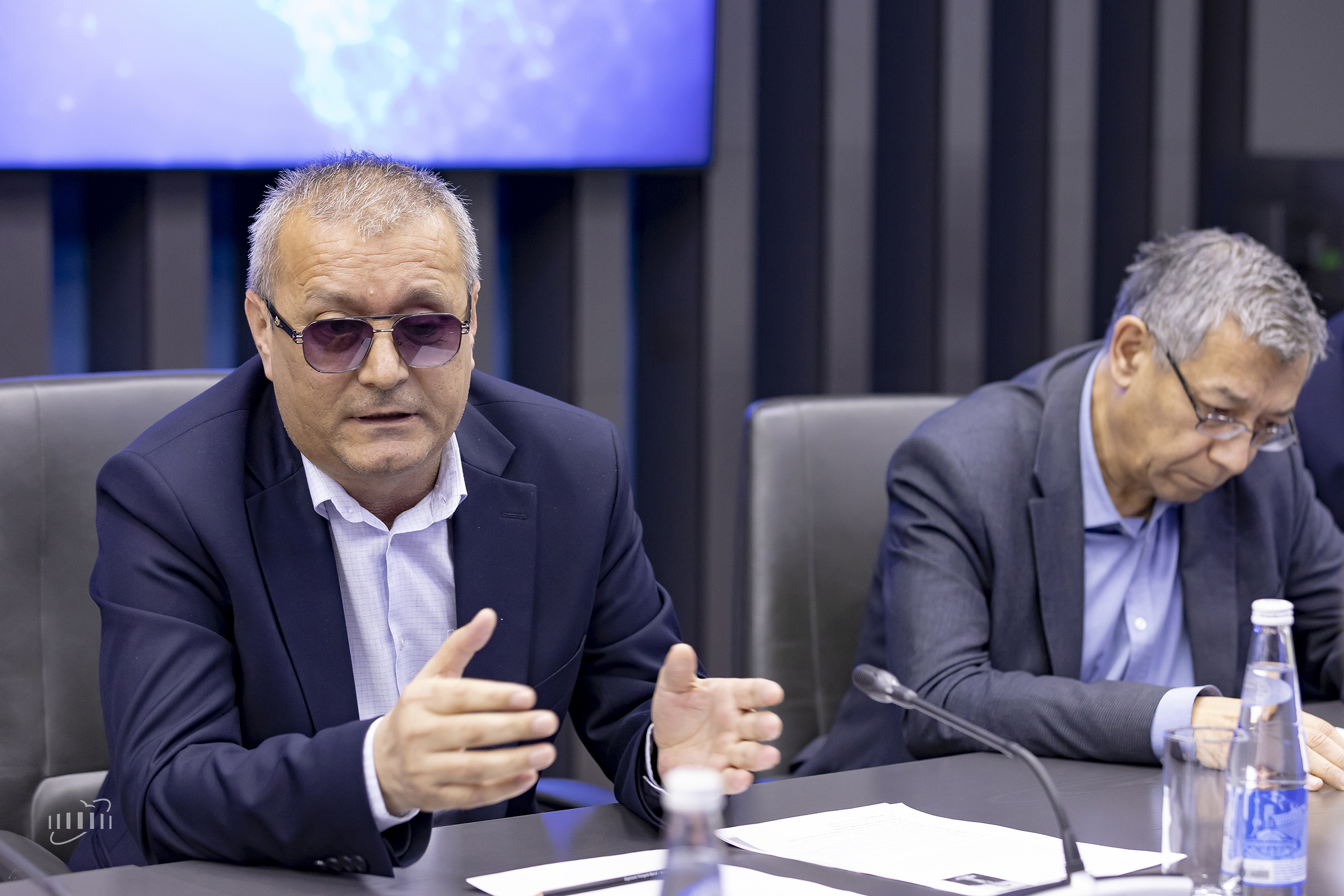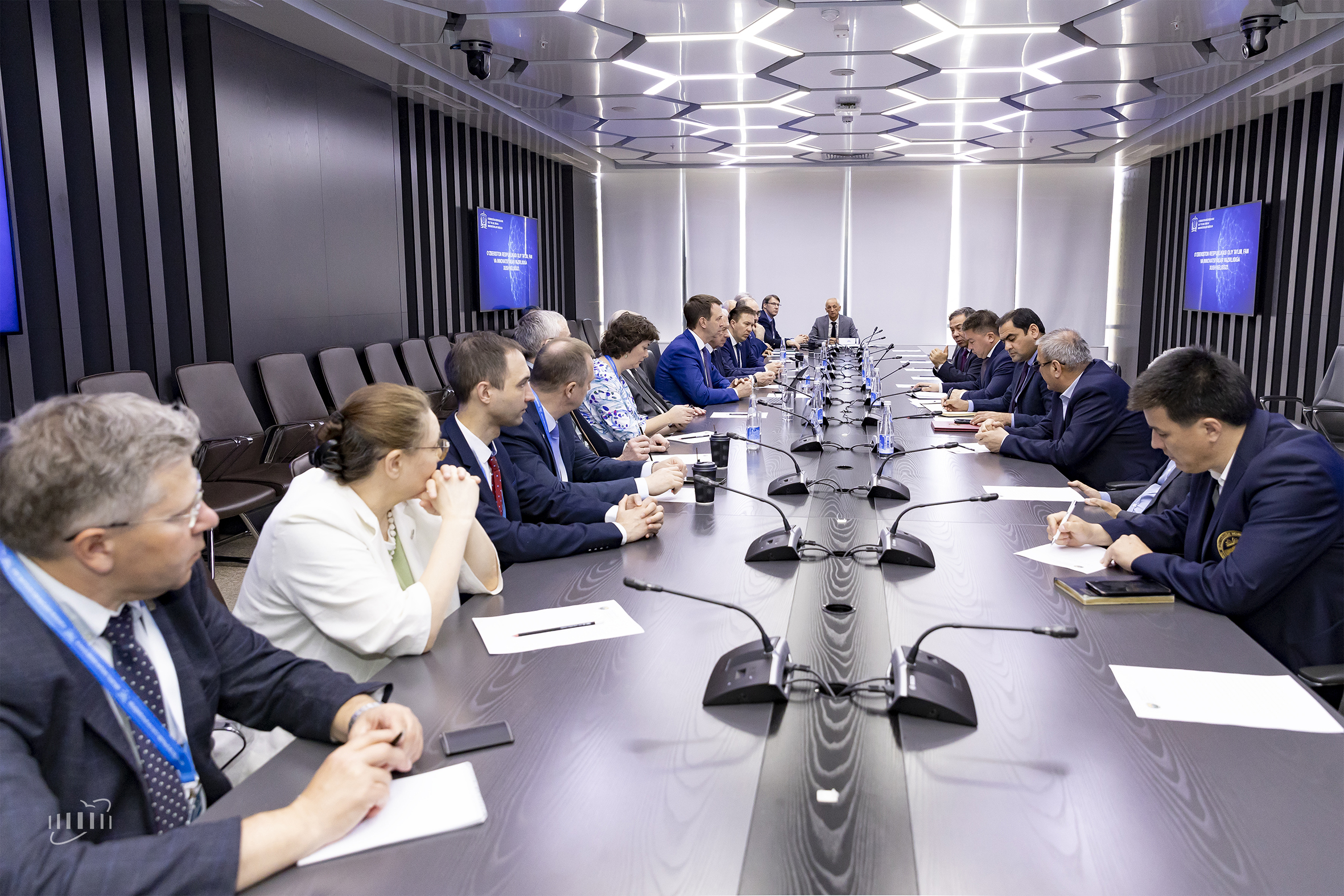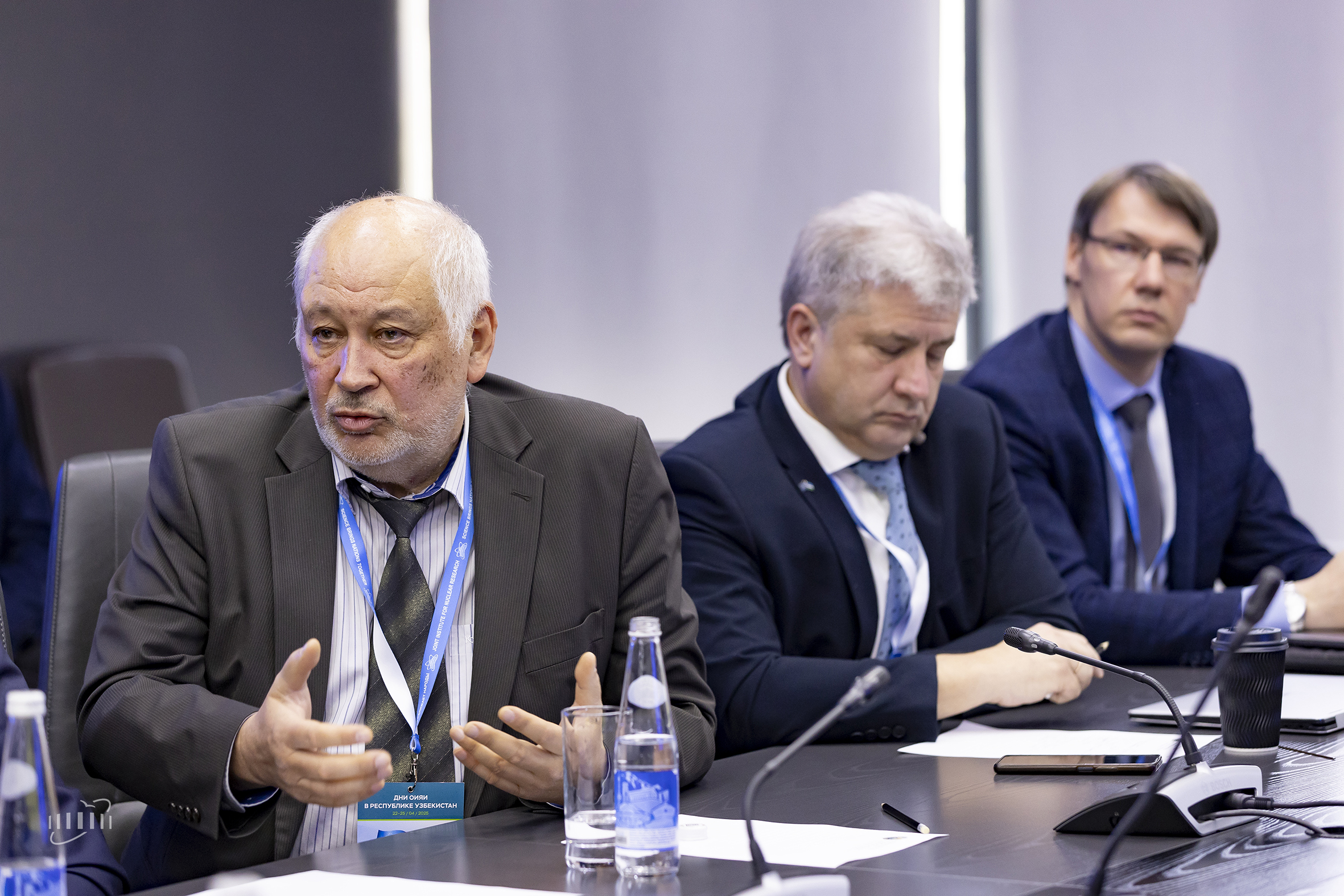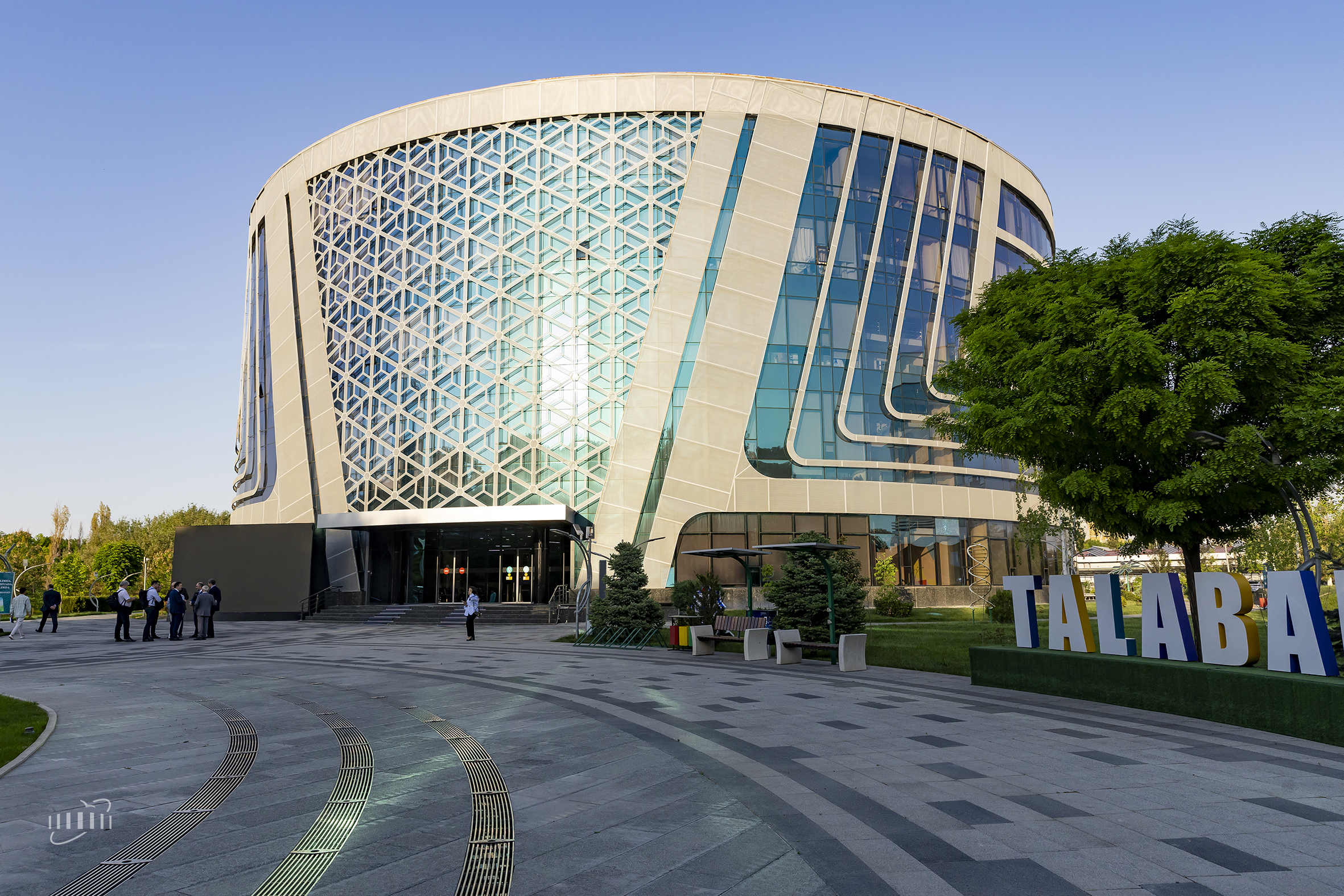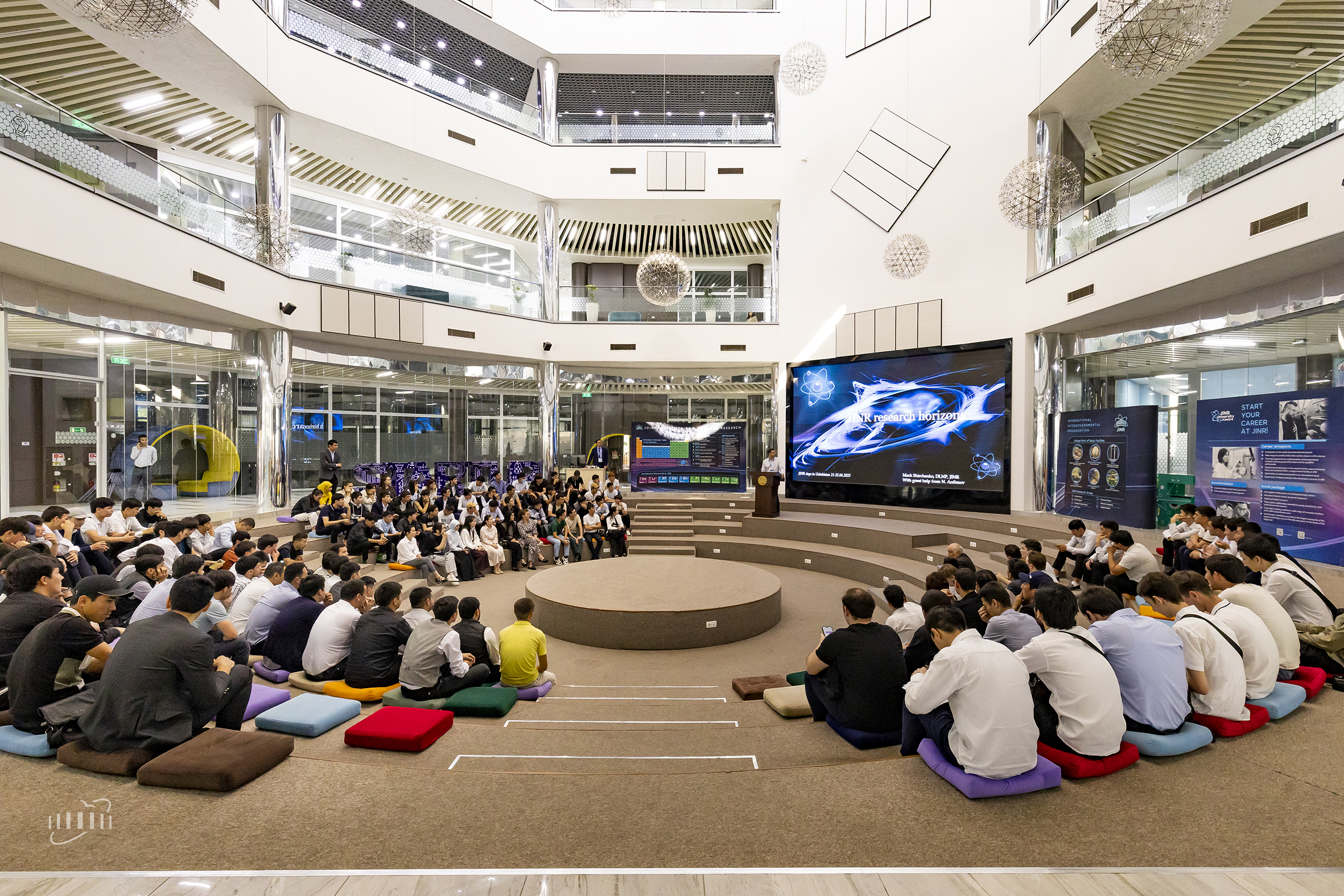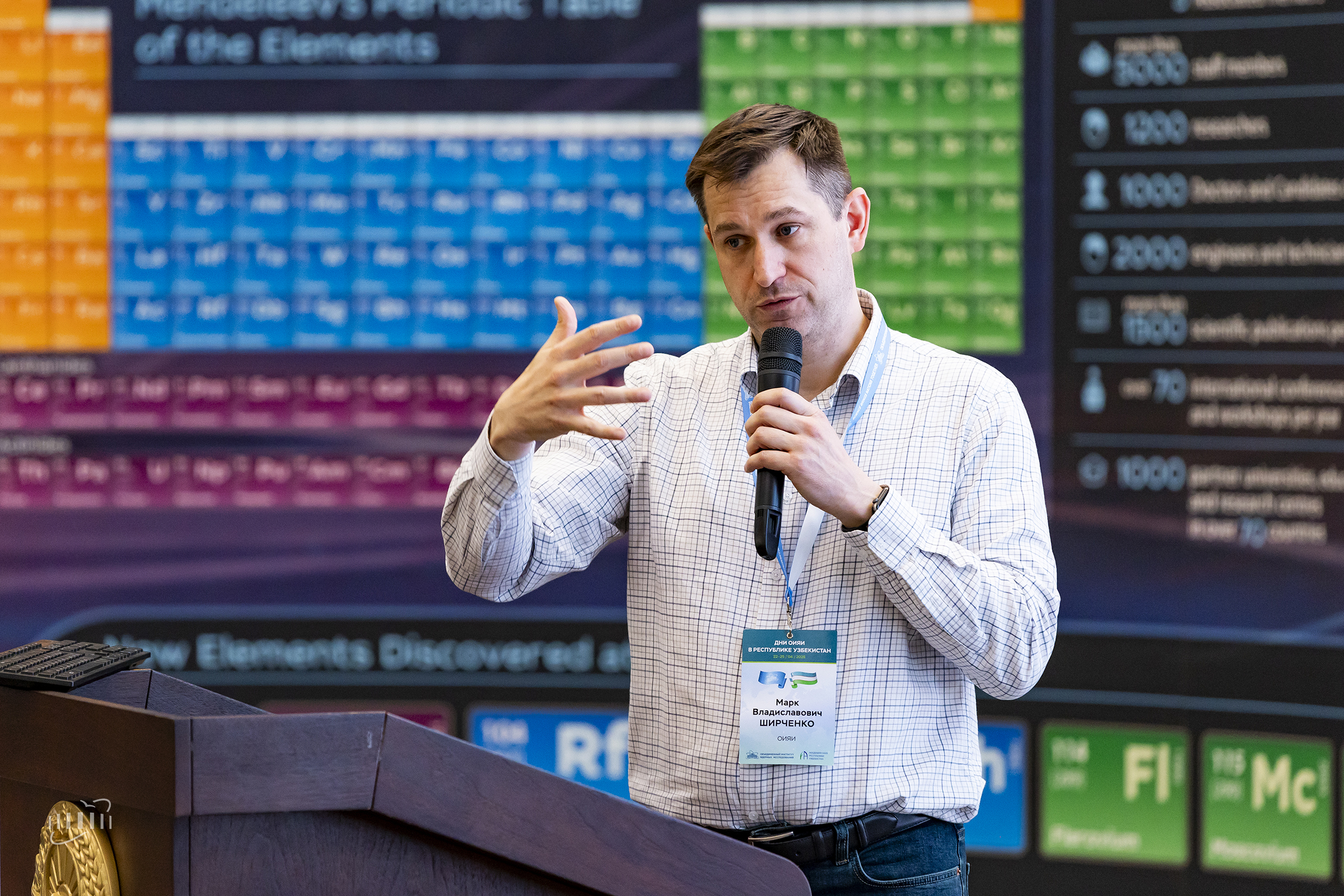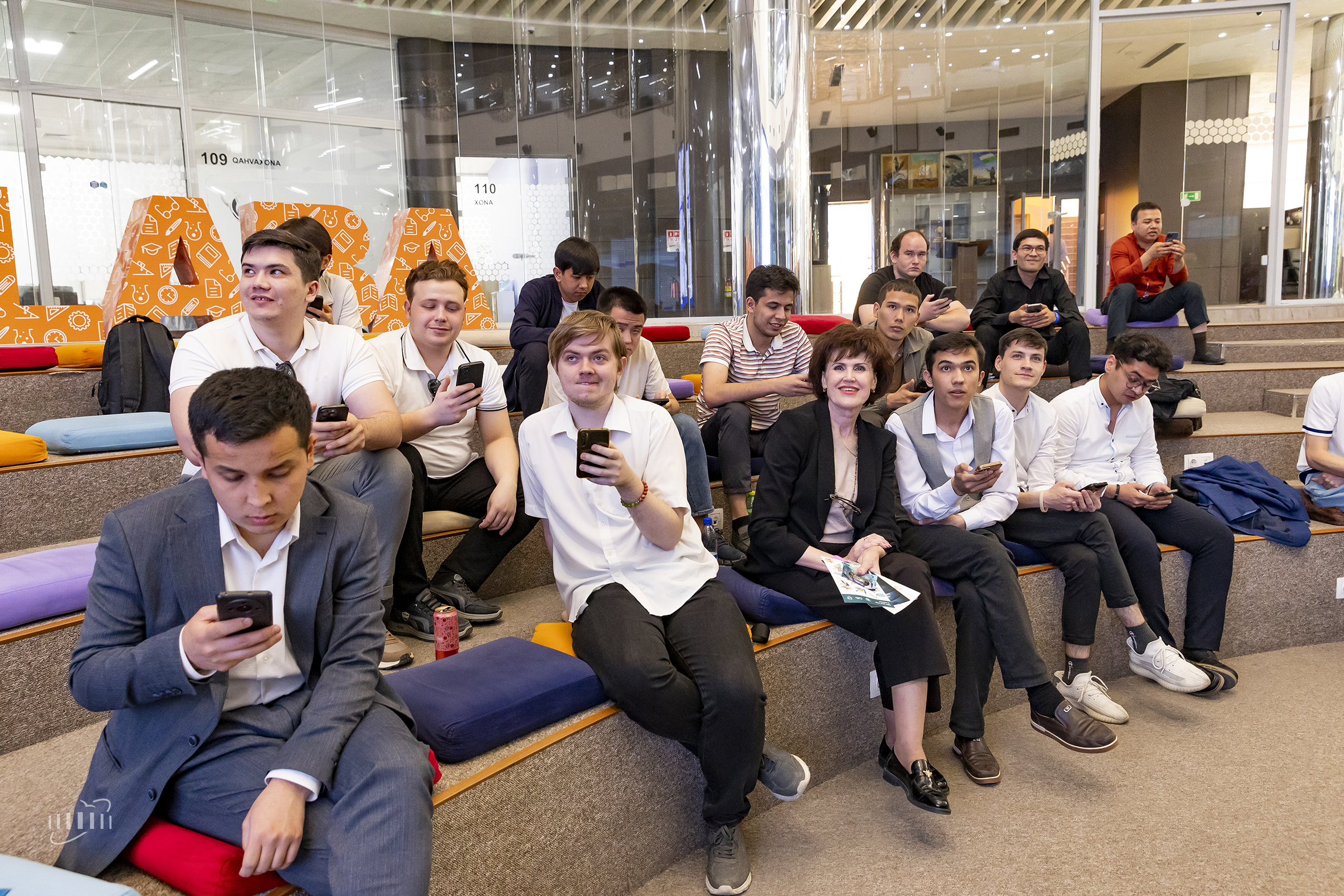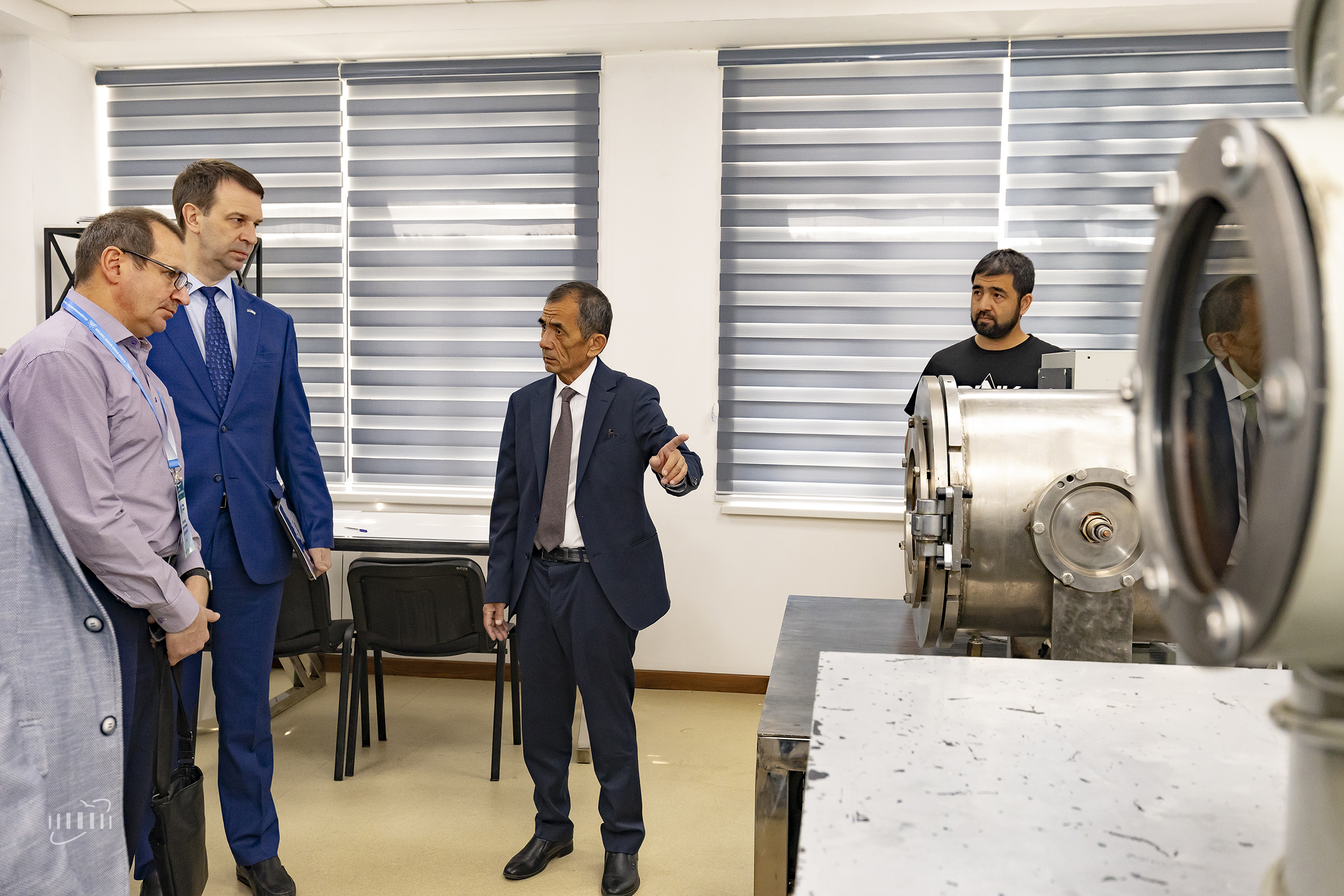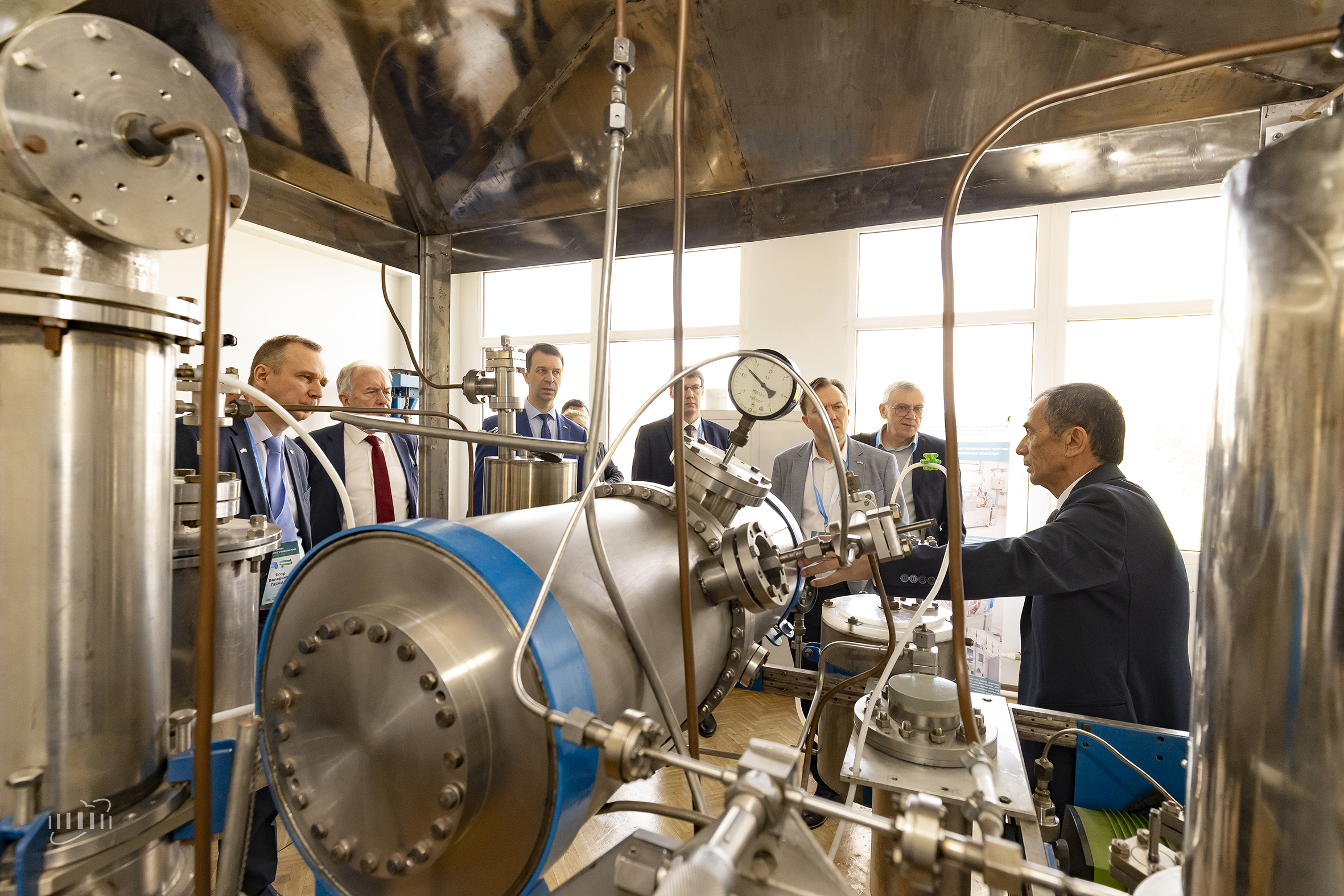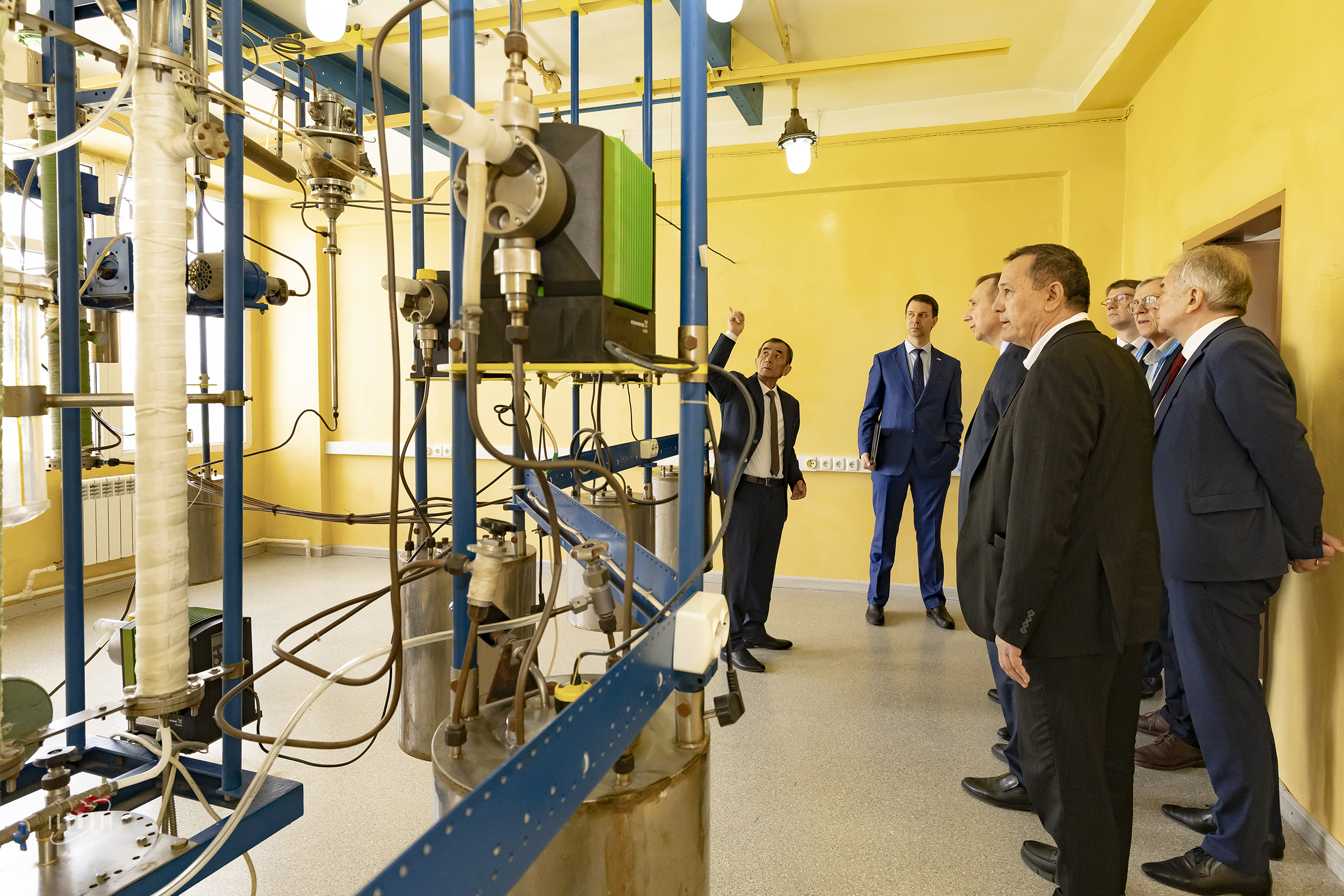Dubna delegation visited Ministry of Higher Education, Science and Innovation of Republic of Uzbekistan
News, 25 April 2025
On 24 April, as part of the Days of the Joint Institute for Nuclear Research in Uzbekistan, a JINR delegation met with First Deputy Minister of Higher Education, Science and Innovation of the Republic of Uzbekistan Shaxrukh Daliyev. The parties discussed organizational aspects of the Republic’s participation in JINR, dual degree programmes of Uzbekistan higher education institutions and Dubna University, internships for Uzbekistan students at JINR.
Welcoming the JINR delegates, First Deputy Minister of Higher Education, Science and Innovation of the Republic of Uzbekistan Shaxrukh Daliyev emphasised JINR’s status as an intergovernmental scientific organization, which includes Uzbekistan in its work. “Physics education in Uzbekistan has a long, rich history. At the same time, with the development of modern technologies, it is very important to exchange expertise with other countries,” Shaxrukh Daliyev said. The First Deputy Minister spoke about the reform of higher education and science in Uzbekistan, which has been taking place over the past decade. The number of universities increased significantly, including 14 branches of universities of the Russian Federation. The approach to science in these universities transformed as well. In addition, based on Russia’s experience, a network of advanced engineering schools is under development.
JINR Director, Academician of the Russian Academy of Sciences (RAS) Grigory Trubnikov expressed gratitude to the leadership of the Ministry and the Republic’s Academy of Sciences (AS RUz) for supporting joint work and organizing working meetings as part of the JINR Days in Uzbekistan. He noted that the partnership intensified in recent years. In October 2022, a JINR cloud computing cluster was created at the AS RUz Institute of Nuclear Physics. Cooperation agreements were signed between JINR and four Uzbekistan universities: the National University of Uzbekistan, Tashkent State Technical University, Namangan Institute of Engineering and Technology, and Samarkand State University. JINR currently employs 19 researchers from Uzbekistan. About 200 students and scientists from the Republic took part in joint projects.
“The key focus of our partnership with Member States is to promote science in these countries,” Grigory Trubnikov stressed. To achieve this objective, practice-oriented training of specialists for the country’s scientific organizations in nuclear physics and related sciences (biomedicine, radiology, radiochemistry, mathematics, and information technology) is carried out. In addition, JINR could contribute to the education of personnel for a nuclear power plant planned for construction in Uzbekistan. The JINR Director emphasised that academic exchange is a mutually beneficial format of interaction that allows young specialists from Uzbekistan to participate in scientific projects of global importance.
JINR actively supports the creation of research infrastructure in the Member States and helps build and commission these facilities. The DC-60 Cyclotron, designed at JINR and constructed in Kazakhstan, is being used for applied tasks: studying materials’ radiation resistance and developing radiopharmaceuticals and track membranes for medicine. In the near future, JINR will participate in developing and building a large scientific infrastructure for the Government of Vietnam. “We are ready to implement serious big projects together,” Grigory Trubnikov suggested. Among potential areas of joint work with Uzbekistan’s physicists, he highlighted the use of nuclear technologies in medicine and ecology, superconductor physics, genome research, and experiments at JINR and INP AS RUz research reactors.
The main topic of discussion was the establishment of joint educational master’s programmes with the Republic’s universities. Dubna State University already has a dual degree programme with Kazakhstan. Joint master’s programmes of Dubna University with JINR have already been developed at the National University of Uzbekistan, Tashkent State Technical University, and Samarkand State University. JINR will participate in the educational process as a scientific platform that will conduct trainings and internships, as well as help students prepare graduation papers. The parties agreed that the next step is to provide information to future applicants about the advantages of such programmes and to attract students.
In order to implement the plans outlined at the meeting, it was decided to draw up a joint Roadmap.
Alongside the Director, the Institute was represented by JINR Vice-Director Latchesar Kostov, JINR Scientific Leader, RAS Academician Victor Matveev, Head of the JINR International Cooperation Department Otilia-Ana Culicov, Deputy Director for Research of the Laboratory of Neutron Physics Sergey Kulikov, and Head of the National Group of Uzbekistan at JINR Anvar Inoyatov.
Director of the AS RUz Institute of Nuclear Physics Ilkham Sadikov, Vice-Rector for Scientific Affairs and Innovation of the National University of Uzbekistan Yaqub Ergashov, Head of the Department for the Development of Scientific and Innovative Activities of the Ministry of Higher Education, Science and Innovation of Uzbekistan Nabijon Holov, and Chief Specialist of the Department of International Cooperation of the Ministry of Higher Education, Science and Innovation Mukhammadaziz Khakimov took part in the talks on behalf of Uzbekistan.
Following the meeting, the Ministry hosted a round table entitled “Opportunities for expanding cooperation between universities of the Republic of Uzbekistan with JINR, Dubna University, and the Moscow State University branch in Dubna“. Among participants were Dubna University Acting Rector Andrey Denikin, JINR University Centre Director Dmitry Kamanin, Deputy Director of the Moscow State University Branch in Dubna Alexander Olshevsky, Directors of the JINR laboratories Evgeny Yakushev (DLNP), Egor Lychagin (FLNP), Aleksander Bugay (LRB), Sergey Sidorchuk (FLNR), Rector of the Dubna International Advanced School of Theoretical Physics Elena Kolganova, FLNR Deputy Scientific Leader Mikhail Itkis, and Deputy Head for Scientific Work of the VBLHEP Department of Methodological Research and Innovation Oleg Belov. The JINR delegation exchanged views on educational processes with representatives of the university community of Uzbekistan.
JINR organized an exhibition at the Ministry of Higher Education, Science and Innovation of the Republic of Uzbekistan about the Institute’s main activities and held a meeting with students of Uzbekistan universities. Dmitry Kamanin, Andrey Denikin, Alexander Olshevsky and sector heads of the Laboratory of Nuclear Problems Mark Shirchenko and Nikolay Anfimov gave lectures. In conclusion, Mark Shirchenko conducted a quiz for students.
On 22–24 April, JINR representatives visited the AS RUz Institute of Nuclear Physics, the Republican Specialised Scientific and Practical Medical Centre of Endocrinology, the Romanovsky Institute of Mathematics, the Institute of Genetics and Plant Experimental Biology, Samarkand State University, the Ulugh Beg Astronomical Institute. Working meetings took place with the leadership of the Academy of Sciences of Uzbekistan, the Arifov Institute of Ion-Plasma and Laser Technologies, Physical and Technical Institute, Institute of Materials Science, and Research Institute of Semiconductor Physics and Microelectronics, as well as with IT Park University representatives.
